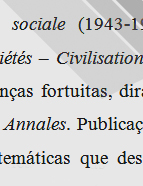

................................
The following may be read in Braudel: "as regards the Annales team, the movement or the pseudo-school of the Annales, what is censured, and what we are censured for, is this specific concern with indispensable freedom, which is freedom of the spirit of research, whatever discovery we make, if there is a discovery at all.” (Braudel, Les ambitions, p. 190).
However, although not an official university publication, the Annales was gradually disseminated, bearing some notable effect in Portugal. Through the testimony of Vitorino Magalhães Godinho, it is known that from a very early stage, perhaps as early as 1935, the journal was available for reading at the National Library of Lisbon (Godinho, A crise, p. 7). In Coimbra, the first issues of the 1929 publication had been donated by France to the Institute of French Studies, possibly through the mediation of a reader, however their reception was interrupted at the request of the Faculty of Arts in 1935! As a means of compensation, the Faculty of Law, which had also been receiving the journal since 1929, maintained its subscription, however the Faculty of Arts only began to receive the publication again in 1961 (Nunes, A História, p. 59). Seemingly, the Portuguese historians were quite alienated from the modernizing research and approaches that marked a historiographical renewal, despite having access to one of the most important publications in the field that promoted new visions and new research. Yet it was as they wished. University masters could easily do without it... Indeed, neither such reputable scholars (which is of no importance here) as Mário Brandão, Manuel Lopes de Almeida, nor later, in Coimbra, Salvador Dias Arnaut, Avelino de Jesus da Costa, nor Manuel Heleno nor Mário de Albuquerque in Lisbon, would ever address an issue that might be deemed social.
But sometimes there are strange revelations and even unexpected surprises, such as the text by Torquato de Sousa Soares, an extraordinary professor at Coimbra, on Marc Bloch, a few years after his death, perhaps in 1953 (although dated 1947 in the volume of the Revista Portuguesa de História, Part III). Strangely enough, he dedicates a heartfelt article to Marc Bloch.
